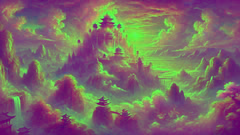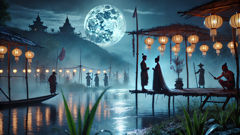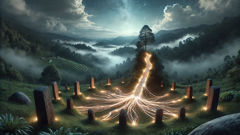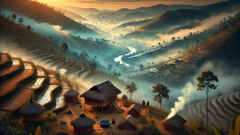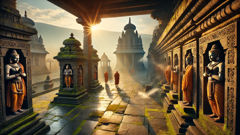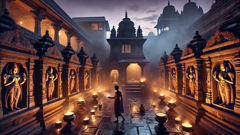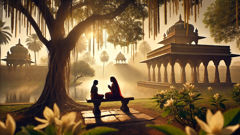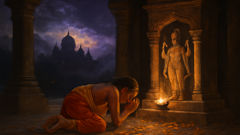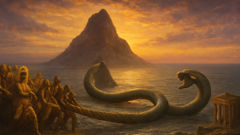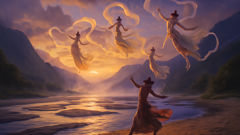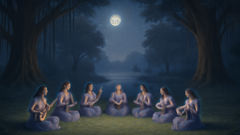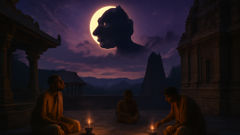Introduction
In the shadowed twilight of the Shang dynasty, China trembled on the cusp of cataclysm. The great capital Zhaoge, once proud and resplendent, now echoed with secret fears and the silent tread of conspirators. At the heart of its marbled halls sat King Zhou, a man whose cruelty had become legend. His every whim, emboldened by the whispers of his beautiful but malevolent consort Daji, sent waves of terror rippling through the empire. Temples burned, wise men vanished, and the common folk prayed for deliverance beneath the pale glow of ancestral altars. Yet, in the heavens above Mount Kunlun, immortal eyes watched and waited. The ancient Jade Emperor, divine sovereign of celestial order, convened his august court. There, the fate of mortals was weighed against the balance of cosmic justice. In secret, immortals and gods debated: Was it time to end the chaos below and invest new guardians for the mortal world? Would the bloodstained Shang give way to a nobler Zhou, or would darkness swallow the land? As the drums of war sounded and magic thickened the air, legendary heroes rose—Ji Fa, the steadfast prince of Zhou; Jiang Ziya, the enigmatic strategist with a destiny written among the stars; Nezha, the rebellious youth wielding divine arms; and Yang Jian, the three-eyed warrior with secrets of his own. Spirits, monsters, and gods tangled their fates with mortals as the armies of Shang and Zhou clashed under banners of fire and thunder. In this swirling tapestry of ambition, vengeance, and hope, every battle echoed not just in the mortal realm but in the heavens themselves. The story of the Investiture of the Gods is one of transformation, where history and myth entwine, and where the courage of a few could shape the destiny of all.
The Last Days of Shang: Tyranny and Despair
In the innermost chambers of Zhaoge, King Zhou’s excesses stretched further each season. The grand feasts grew ever more obscene, gilded halls filled with laughter as cruel as a wolf’s snarl. Yet outside these walls, the heart of the empire withered. Daji, whose beauty was matched only by her appetite for suffering, prowled the palace with eyes like polished jade. Her presence was a storm—one that swept away the wise, the just, and the innocent. Ministers dared not speak, for their tongues might be severed. Priests who counseled compassion vanished without a trace. Even the royal ancestors seemed to shudder in their cold stone shrines. Rumors drifted through the capital: King Zhou had ordered the creation of the Paolao, a monstrous bronze pillar heated by fire, to punish dissenters. The people, battered by war taxes and famine, watched as neighbors disappeared in the night, and learned the silence of fear.
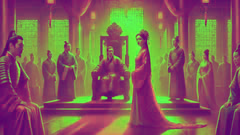
In distant villages, resistance flickered like a stubborn candle. Old men gathered beneath ancient locust trees, whispering stories of Shang’s virtuous beginnings, now forgotten by a ruler bewitched. Among them, a handful still believed in prophecy—that the Mandate of Heaven could be revoked, that new heroes would rise. Far to the west, in the valleys of Zhou, one such hero prepared. Prince Ji Fa, noble and just, listened to the tales of his father Ji Chang, the wise Lord of the West who languished as a prisoner in Zhaoge. His heart burned with the shame of his people’s suffering, but his mind remained clear. He knew the time was not yet ripe; patience was the virtue of those who would change the world.
Meanwhile, destiny stirred on Mount Kunlun. The immortal Master Yuanshi Tianzun summoned his disciples, sensing the world’s imbalance. Among them was Jiang Ziya, white-bearded and sharp-eyed, who had wandered for decades in search of meaning. Now, as an old man, his moment approached. With a bamboo rod slung across his shoulder and a gaze that pierced veils of illusion, Jiang Ziya descended the mountain, burdened with an invisible command: to restore order and invest new guardians for humanity. He was not alone. Spirits sensed the shifting winds; foxes, snakes, and vengeful specters slithered through the cracks of the world, drawn by chaos. The gods themselves bickered over the fate of mortals. Each soul—divine or otherwise—felt the coming storm.
In the capital, Daji’s cruelty ripened. She delighted in the suffering she caused, coaxing King Zhou into ever more monstrous acts. Yet beneath her laughter simmered ancient rage: for Daji was no mere woman but a fox spirit in mortal guise, sent to corrupt and ruin. Her servants, loyal only to fear and gold, roamed the city at her whim. The people of Zhaoge grew thin and hollow-eyed, their prayers unanswered. Still, hope survived in secret: in coded messages passed between loyalists, in temple offerings left for forgotten gods, and in the dreams of children who saw armies of light marching beneath banners of thunder.
Heavenly Schemes: The Gathering of Heroes
As the chill of early spring crept over the land, Mount Kunlun’s sacred heights shimmered with anticipation. The celestial halls glowed with pearlescent light, where ancient immortals debated the course of fate. The Jade Emperor’s decree was clear: the world could no longer endure Shang’s cruelty. New gods would be chosen—not by whim, but by trial. The lists were drawn: mortals whose courage, loyalty, or wisdom would earn them a place among the stars. Yet first they must struggle, bleed, and even perish in the furnace of history.
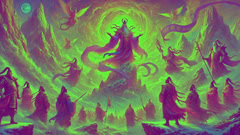
Jiang Ziya, appointed as Heaven’s prime minister, shouldered a weight few could imagine. His path led him to Xiqi, cradle of Zhou resistance. There he found Ji Fa and his loyal retainers—Huang Feihu, once a mighty general of Shang who had defected in outrage over King Zhou’s barbarity; Nezha, the tempestuous youth reborn from a lotus; and Yang Jian, mysterious and serene, whose third eye saw through the lies of gods and men alike. Each hero bore their own scars and secrets. Huang Feihu mourned family lost to Daji’s wrath. Nezha sought redemption for old rebellions. Yang Jian concealed a divine heritage and a purpose known only to the heavens.
Together, under Jiang Ziya’s guidance, the heroes began weaving alliances. Brave lords of smaller states pledged support, inspired by visions or haunted by nightmares. Their banners multiplied—crimson tigers, golden dragons, and soaring cranes—all gathering under the Zhou standard. In secret councils, Jiang Ziya divined auspicious days for battle and crafted strategies as intricate as the stars. Yet for all their courage, the Zhou warriors faced monstrous odds. Shang’s armies outnumbered them ten to one, led by warlords with more ambition than mercy. And then there were Shang’s supernatural defenders: demon generals, vengeful spirits, and sorcerers wielding forbidden arts. The mortal struggle would be only half the war.
Back in Zhaoge, Daji and her ilk did not sit idle. She conjured fox-fire to spy on her enemies and whispered poison into King Zhou’s ear. She summoned a host of spirits: thousand-year snakes, phantom hounds, and deadly assassins in midnight veils. In the night, ghostly shapes flitted over the city walls. Some sought out Zhou loyalists; others prowled the dreams of generals, planting seeds of terror and doubt. Yet even Daji could sense a new power gathering. The old magic was shifting—Heaven itself had chosen sides.
The Fires of War: Battles of Gods and Mortals
War came with thunder. The armies of Zhou and Shang met on fields churned to mud by rain and blood. Jiang Ziya’s tactics often turned the tide: at Muye, he lured Shang’s forces into an ambush with decoy banners and illusions woven from talismans. Nezha’s fiery wheels scorched enemy ranks, his spear flashing like lightning. Yang Jian’s third eye blazed on the battlefield, revealing hidden threats—enchanted traps, shapeshifting monsters, and sorcerers veiled by smoke. Huang Feihu rode at the vanguard, his armor gleaming with banners streaming behind him like comet tails. The clash of armies shook the sky.
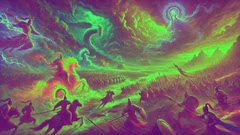
Yet every mortal struggle had its counterpart in the spiritual realm. The air thickened with magic—immortals appeared on distant hills, their robes fluttering as they guided the fate of heroes below. At times, gods would descend disguised as old beggars or wandering monks, testing the virtue of generals. Spirits whispered warnings to the worthy, or sowed confusion among the wicked. In one crucial battle, Nezha faced a demon general: a giant with a body of iron and breath of fire. The two clashed beneath storm-blackened skies. Nezha, bloodied but unbowed, called upon his divine weapons—the Universe Ring and Red Armillary Sash—to shatter his foe’s armor and send him hurtling back to the underworld.
Elsewhere, Ji Fa and Huang Feihu stormed Shang outposts guarded by magical beasts—nine-headed lions and thunder eagles whose roars split mountains. At the River Crossing, Yang Jian summoned wind and fog to cloak their retreat, foiling a deadly ambush. But for every victory, they suffered loss. Loyal warriors fell, their names to be honored in Heaven’s investiture. Great lords sacrificed themselves to save their soldiers. The Zhou cause was forged in both triumph and sorrow.
Back in Zhaoge, Daji’s sorcery grew desperate. She unleashed curses upon the land—plagues of locusts, unnatural droughts, and rivers that ran red. Yet for all her cunning, cracks began to show. The people’s faith in King Zhou crumbled. Even among his generals, doubt took root. The Mandate of Heaven was slipping away.
Conclusion
As the dust settled on fields once torn by war, a hush fell over the land. The Shang dynasty’s last defenders scattered or surrendered, their banners trodden into muddy earth. King Zhou, bereft of followers and fortune, fled to his burning palace. Daji’s illusions faltered at last; stripped of her glamour, she was revealed and punished by those she had tormented. In Zhaoge’s ruins, the people mourned and rejoiced—a tyrant gone, a new dawn uncertain.
From Mount Kunlun, immortal eyes watched the birth of a new order. Jiang Ziya, weary yet resolute, ascended to invest the worthy among fallen heroes—those whose loyalty, sacrifice, or courage had shone brightest. Their names would echo as gods and stars, guardians of thunder, rain, and destiny itself. Ji Fa was crowned King Wu of Zhou, wise and just, restoring peace to a battered realm. Temples were rebuilt, fields sown anew, and hope blossomed where fear had once ruled. Yet even as Heaven smiled upon Zhou’s rise, legends whispered that balance must always be guarded. The cycle of gods and mortals would go on—a lesson carved in the bones of history, as old as China itself.

